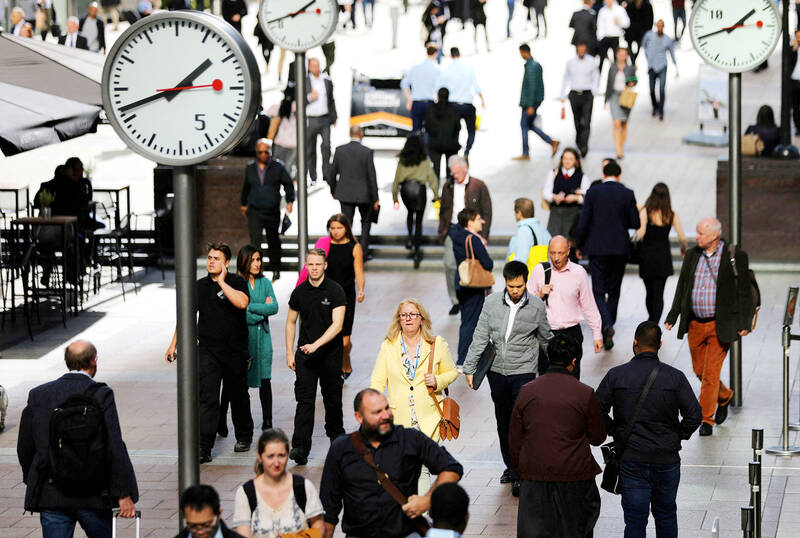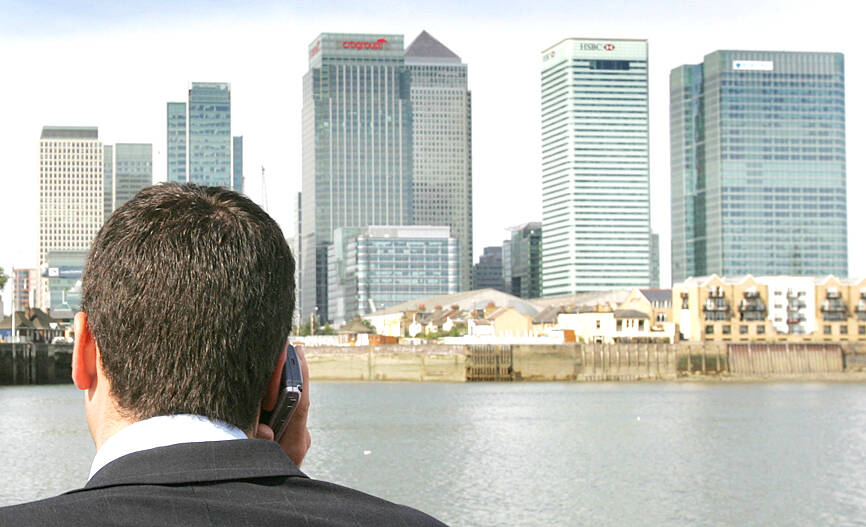City of London workers looking to save money may want to embrace the office over winter as the cost of working from home soars alongside energy bills.
Those prepared to go into the office every day could save about €50 (US$60) per week in January 2023 if they can walk, run or cycle into their workplace. That’s thanks to the money they’ve saved by not heating a home for the whole day, according to estimates by price comparison site Uswitch.
Those working from home in January could expect to pay around €175 a week in energy costs and other incidentals included in Bloomberg’s calculations such as buying in your own coffee, a freebie in many offices. The combined cost of energy bills — factoring in the lower consumption expected — and five return trips on the Tube from London’s Zone 4 would be about €160 a week in January 2023, a €15 saving.

Photo: Reuters 照片:路透
For those taking the bus, the total cost is about €140, a €35 weekly saving. In both cases, any rise in the cost of the commute will eat into those savings.
Uswitch estimates that the average monthly energy bill could hit €683 in January for home workers, compared to €492 for those heading to the office. It assumes remote workers use 25 percent more electricity and 75 percent more gas per day including from central heating.
Coping Mechanism

Photo: Reuters 照片:路透
“People are going to be really struggling to heat their own homes and they are going to look for warmth in other places — we know that is a coping mechanism that people use, whether that is going to a public space, such as a library or a church maybe, or whether it’s going to work when you usually would work from home” Matt Copeland, policy officer at National Energy Action said. “Those are the options people will consider and people will take to actually find warmth.”
The incentive to come into the office is likely to be welcomed by some in the City of London, where finance bosses have been pushing for a return to the office. Right now less than half of workers in the UK’s banking sector go into the office on an average day, and just 18 percent of insurance sector employees do so, according to a survey by consultancy Advanced Workplace Associates.
(Bloomberg)
在家工作的成本隨著能源費用的飆升一起上漲,因此到了冬天,想要省錢的倫敦城上班族可能會希望進辦公室上班。
準備每天去辦公室的人若可以走路、跑步或騎自行車到工作地點的話,在二○二三年一月,每週可節省約五十英鎊(六十美元)。根據價格比較網站Uswitch的估計,他們之所以省下這些錢,是因為家裡整天都不開暖氣。
一月份在家工作的人預計每週要支付大約一百七十五英鎊的能源費用,以及彭博社所計算出的其他雜費,例如自費買咖啡——很多辦公室會免費供應咖啡。二○二三年一月能源帳單的總成本(以預期較低的花費計算),加上由倫敦第四區坐地鐵來上班來回五次,每週將花費約一百六十英鎊,因此跟在家工作相比,到辦公室上班節省了十五英鎊。
坐公車上班的人,總花費則約為一百四十英鎊,每週可節省三十五英鎊。在坐地鐵和公車這兩種情況下,任何通勤成本的增加都會消耗所省下的錢。
Uswitch估計,在家工作的人,一月份的平均能源費用可能會達到六百八十三英鎊,而到辦公室上班的人則為四百九十二英鎊。這是假設遠距上班的人每天多使用百分之二十五的電力,以及多百分之七十五的瓦斯,包括用於中央暖氣。
因應機制
「要把自己家裡變暖將是難以負擔的窘境,所以人們會到其他地方取暖——我們知道這是一種因應機制,無論是去公共場所,比如圖書館或教堂,或是在你通常在家工作的時候到辦公室上班」,國家能源行動組織政策主管馬特‧科普蘭表示。「人們會考慮和採用這些選項,而實際上找到暖源」。
對於這進辦公室的動機,倫敦城某些人可能會樂見其成。這些金融業老闆一直在推動員工重返辦公室。根據諮詢公司Advanced Workplace Associates的一項調查,目前英國銀行業平均只有不到一半的員工進辦公室上班,而保險業只有百分之十八的員工這麼做。
(台北時報林俐凱編譯)

The Dutch introduced the Indian mango (Mangifera indica) to Taiwan in the 17th century. It is a green-skinned mango with thick fibers that get stuck in the teeth, but it boasts a rich aroma and a unique taste. In 1954, Taiwan’s Council of Agriculture introduced several mango cultivars from Florida, USA, including the Irwin, Haden, and Keitt varieties. After seven years of testing and domestication, the Irwin variety was chosen for promotion. Years later, the sample saplings started to bear fruit. These mangoes were large, with thin, vibrant red peels and golden pulp. The Irwin mangoes were mouth-wateringly sweet and

As the priest Antonius Hambroek stood in the dim chamber of Fort Zeelandia, his eldest daughter clung to him, her voice trembling. “Father, don’t go. They’ll kill you, and what will become of Mother and my sisters?” Outside, the sounds of Koxinga’s relentless canon siege boomed through the fortress. The defenders were on the brink of collapse. Starvation gnawed at their resolve, and the air carried the acrid stench of spent gunpowder and rotting flesh. Dutch reinforcements from Batavia had failed to arrive, leaving the garrison isolated and hopeless. Hambroek’s face was calm, though sorrow weighed heavily on his

對話 Dialogue 清清:今天中午我要多吃一點,不然晚上可能會吃不飽。 Qīngqing: Jīntiān zhōngwǔ wǒ yào duō chī yìdiǎn, bùrán wǎnshàng kěnéng huì chībùbǎo. 華華:怎麼了?為什麼會吃不飽? Huáhua: Zěnmele? Wèishénme huì chībùbǎo? 清清:今天大年初七,是「人日節」,傳統上結了婚的女兒要回家給父母送長壽麵,而且最好是素的,我姐姐會回來,只吃素麵,我應該很快就餓了。 Qīngqing: Jīntiān Dànián chūqī, shì “Rénrì jié,” chuántǒng shàng jiéle hūn de nǚ’ér yào huíjiā gěi fùmǔ sòng chángshòumiàn, érqiě zuìhǎo shì sù de, wǒ jiějie huì huílái, zhǐ chī sùmiàn, wǒ yīnggāi hěn kuài jiù èle. 華華:我還是第一次聽說有「人日節」呢!這是怎麼來的啊? Huáhua: Wǒ háishì dì yī cì tīngshuō yǒu “Rénrì jié” ne! Zhè shì zěnme lái de a? 清清:老一輩的人說,女媧是在第七天造出了「人」,所以今天可說是我們每個人的「生日」呢!生日快樂! Qīngqing: Lǎoyíbèi de rén shuō, Nǚwā shì zài dì qī tiān zào chūle “rén,” suǒyǐ jīntiān kěshuōshì wǒmen měi ge rén de “shēngrì” ne! Shēngrì kuàilè! 華華:你也是啊!欸?那前六天女媧都做了什麼呢? Huáhua: Nǐ yěshì a! Éi? Nà

As we bundle up in thick coats to stay warm during the winter, there is a population that has already adapted to extremely low temperatures. These people live in the remote city of Yakutsk, the coldest city on Earth. Yakutsk is situated in the heart of Siberia, which is the capital of the Sakha Republic in Russia. This historic mining city began to flourish in the 19th century following the discovery of gold deposits. Given its construction on permafrost, the average temperature in the city remains below 0°C for over half the year, with winter temperatures dropping to an astonishing -50°C.